湖南省株洲县渌口镇中学八年级英语下册 Unit 3 Could you please clean your room Period 3 Section A教案
湖南省株洲县渌口镇中学八年级英语下册《Unit 3 Could you please clean y
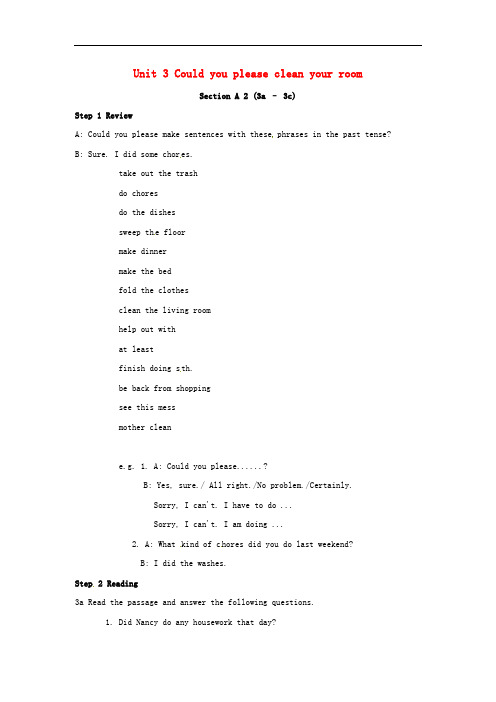
Unit 3 Could you please clean your roomSection A 2 (3a – 3c)Step 1 ReviewA: Could you please make sentences with these phrases in the past tense? B: Sure. I did some chor es.take out the trashdo choresdo the dishessweep th e floormake dinnermake the bedfold the clothesclean the living roomhelp out withat leastfinish doing s th.be back from shoppingsee this messmother cleane.g. 1. A: Could you please......?B: Yes, sure./ All right./No problem./Certainly.Sorry, I can't. I have to do ...Sorry, I can't. I am doing ...2. A: What kind of c hores did you do last weekend?B: I did the washes.Step 2 Reading3a Read the passage and answer the following questions.1. Did Nancy do any housework that day?2. Why was Nancy’s mom angry with Nancy?3. Did they solve the problem? How?3b. Read the story again and read the sentences below. Underline the sentences from the reading that mean the same thing.1. Neither of us did any housework for a week.2. My mom came over as soon as I sat down in front of the TV.3. You’re tired, but I’m tired, too.3c. Decide whether the underlined words in the sentences are verbs or nouns. Then write another sentence using the underlined word in the other form.1.Could you take the dog for a walk? (noun)2. Could I watch one show first?3. I can’t work all day.4. You watch TV all the time.5. “What happened?” she asked in surprise.Step 3 Language points1. You watch TV all the time and ...all the time(在该段时间内)一直;向来,一向;时时刻刻;每时每刻e.g. I do this all the time. 我一直是这么做的。
湖南省株洲县渌口镇中学八年级英语下册《unit 3 could you please clean
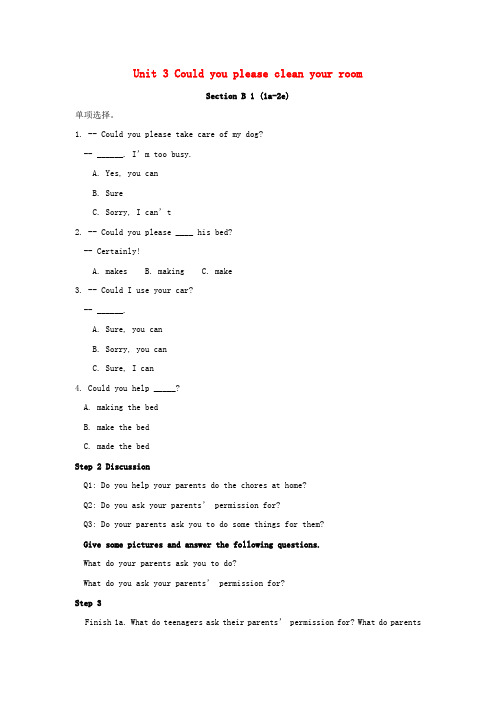
Unit 3 Could you please clean your roomSection B 1 (1a-2e)单项选择。
1. -- Could you please take care of my dog?-- ______. I’m too busy.A. Yes, you canB. SureC. Sorry, I can’t2. -- Could you please ____ his bed?-- Certainly!A. makesB. makingC. make3. -- Could I use your car?-- ______.A. Sure, you canB. Sorry, you canC. Sure, I can4. Could you help _____?A. making the bedB. make the bedC. made the bedStep 2 DiscussionQ1: Do you help your parents do the chores at home?Q2: Do you ask your parents’ permission for?Q3: Do your parents ask you to do some things for them?Give some pictures and answer the following questions.What do your parents ask you to do?What do you ask y our parents’ permission for?Step 3Finish 1a. What do teenagers ask their parents’ permission for? What do parentsask their teenagers to do? Write parents or teenagers next to eachphrase.1. buy some drinks and snacks2. borrow some money3. clean your room4. invite my friends to a party5. go to the store6. use your CD player7. take out the rubbish8. make your bedStep 4.Finish 1b. Use the phrases in 1a to make conversations.Step 5 Pair work1. Parents: Could you please…?Child: Yes, sure. / Sorry, I can’t. I have to ...2. Child: Could I …?Parents: Yes, you can. / No, you can’t. You ...Step 6 ListeningFinish 1c. Listen to a conversation between Sandy and her mom. Chec k (√ ) the things in 1a that you hear.1. buy some drinks and snacks2. borrow some money3. clean your room4. invite my friends to a party5. go to the store6. use your CD player7. take out the rubbish8. make your bedFinish 1d. Listen again. Fill in the chart.Step 7 Finish 1e.You are having a party. Invite your partner to come your party and ask for help withthese things. So, talk about the following things with your partner.e.g.A: Would like to come to my birthday party?B: Yes, I’d love to./Sorry, I can’t. I have to…A: Could you please take out the rubbish?B: Yes, sure./N o, I can’t. I have to do…Step 8 Reading1. Warming up2a. Discuss the questions with your partner1) What do you often do to help your parents at home?2) Do you think kids should help out with chores at home?2. New wordsstress n. 精神压力; 心理负担waste n.浪费; 垃圾 v. 浪费; 滥用depend v. 依靠; 依赖develop v. 发展; 壮大fairness n.公正性; 合理性since conj. 因为; 既然prep., conj. & adv. 从……以后; 自……以来neighbor(= neighbour) n. 邻居drop v. 落下; 掉下3. Skimming2b. The Sunday Mail magazine invited parents to write about whether they think young people should do chores at home. Skim the following letters. Which one agrees and which one disagrees?了解阅读策略:Skimming 意为“快速掠过,从中提取最容易取得的精华”。
八年级英语下册 Unit 3 Could you please clean your room(第3

Could you please clean your room教学过程1 / 8复习时间5 m 1复习已学目标语和导入有礼貌地提出请求和向别人请求许可的话题。
M: Could you please take out the trash?N: No, I can’t. I want to have a rest. Could Iwatch theTV show first?M: No. I think you should share the housework at home. I need your help.N: OK. Mom, I will do it.2仿照上述对话,组织Pair work复习活动。
OK. Now please make newconversations betweenNancy and her mother.学生双人活动,教师抽查几对学生。
导入时间2 m 3导入新课话题。
Well, we’re going to learn Unit 3 Could you please clean the room?4 引入单元标题。
教师板书或课件显示:Unit 3 Could you please clean the room?Grammar focus 时间6 m 5观察总结,对本单元的语法要点进行梳理。
Let’s read Grammar Focus aloud.Now please discuss in groups about the following questions:1.有礼貌地提出请求的句型及答语。
2.有礼貌地向别人请求许可的句型及答语。
Help the students and then ask the students to showtheir answers.学生进行探究汇报,教师点评、补充。
6熟读grammar focus中的句子,进一步理解目标知识点。
八年级英语下册 Unit 3 Could you please clean your room教案

Unit 3 Could you please clean your room?教学目标:1语言目标:谈论做家务的词汇,及如何有礼貌的提出要求。
2 技能目标:能听懂和谈论做家务的话题;能写出重点单词和重点句型。
3 情感目标:培养学生爱劳动,分享家务的能力。
教学重点短语: do the dishes, make the bed, take out the rubbish, fold the clothes, sweep the floor, clean the living room ……句子:1. Could you please take out the rubbish?. Sure. / Sorry, I can’t. I have to finish homework first.2. Could I use your puter?Sorry. I'm going to work on it now.3. Well, could I watch TV?Yes, you can. But first you have to clean your room.教学难点:Make polite requestsAsk for permission课时划分:Period 1 Section A 1a – 2dPeriod 2 Section A 3a-3cPeriod 3 Section A Grammar focus-4cPeriod 4 Section B 1a-2ePeriod 5 Section B 3a-Self checkSection A1 (1a – 2d)Step 1 Presentation1. Watch the photos a nd talk about them “What does he do every day?’ and learn thesephrases: do chores, do the dishes, make the bed, take out the rubbish, fold theclothes, do the laundry, clean the living room.2. Play a game. You do and I say. Work with your partner, and guess what he/she does.3. Look these phrases and practice the conversation: Could you please take out therubbish? Sure. / Sorry, I can’t. I have to finish homework first.4. 1a Do you do these chores at home? Discuss them with your partner.Step 2 Listening1b Listen. Who will do these chores? Check (√) Peter’s mother or Peter.Step 3 Practice1c Make conversations about the chores in 1a.Make conversations.ExamplesA: Could you please...?B: Yes, sure. /All right. /No problem./Certainly.Sorry, I can't. I have to do...Sorry, I can't. I am doing...Step 4 Listening 2a&2bPeter asks his father if he can do four things. What does his father say? Check (√) “yes” or “no”. Listen again. Draw lines to the reasons.Listen to the tape again and underline how Peter asks permission and request and pay attention to his father’s replies.Peter: Hey, Dad?Dad: Yes?Peter: Could I go out for dinner with my friends tonight?Dad: Sure, that should be OK.Peter: Could I go to the movies after that? My friends said the new action movie is really good.Dad: I guess so. But don’t stay out late.Peter: Could I stay out until eleven? We might get something to drink after the movie. Dad: No, you can’t. You have a basketball game tomorrow, remember? You need a good rest. Peter: Oh, yeah. Well, could you give me a ride to town now? If I take the bus, I’ll be late.Dad: I can’t, Peter. I have to do some work now.Peter: Oh, OK. I’ll call Alan. Maybe his dad can give me a ride.Step 5 PracticeAsk for permission礼貌地取得同意2c Make conversations using the information in 2a and 2bA: Could I use your puter?B: Sorry. I’m going to work on it now.A: Well, could I watch TV?B: Yes, you can. But first you have to clean your room?2d Role –play the conversationStep 6 Language points1. Tony, could you please help out with a few things?help out 动词短语,表示在某人繁忙或遇到困难时“给予帮助”。
八年级英语下册 unit 3 could you please clean your
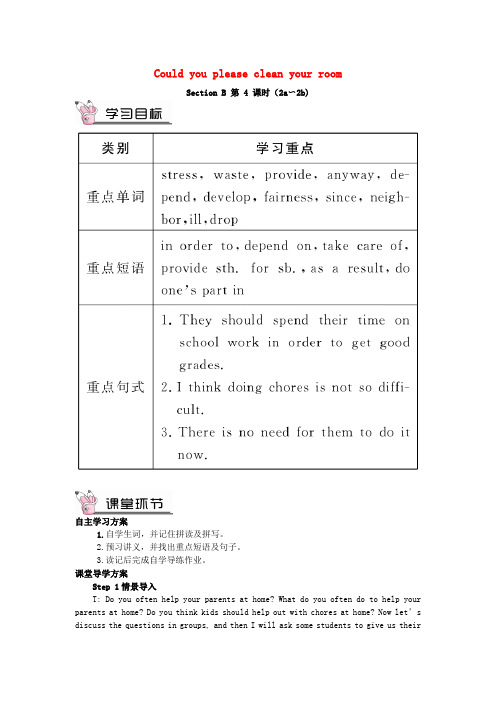
Could you please clean your roomSection B 第 4 课时(2a〜2b)自主学习方案1.自学生词,并记住拼读及拼写。
2.预习讲义,并找出重点短语及句子。
3.读记后完成自学导练作业。
课堂导学方案Step 1情景导入T: Do you often help your parents at home? What do you often do to help your parents at home? Do you think kids should help out with chores at home? Now let’s discuss the questions in groups, and then I will ask some students to give us theirpoints of view.环节说明:以2a中的问题作为讨论的话题,既完成了 2a的教学任务,同时又引出了本节课的学习重点(2b中的短文)。
Step 2完成教材2a—2b的任务1.别离让每一个小组就小孩是不是应该帮父母做家务那个问题发表各自的观点。
2.快速读短文,回答下列问题。
(1)Does Mrs Miller agree to do housework?(2)What does she think the students’ stress come from?(3)How about Mr Smith?(4)Whose opinion do you agree with?3.教师按照学生回答问题的情形来判断学生对文章理解的程度。
4.再读短文,找到重点的语言点及不睬解的语言点。
5.教师点拨短文中出现的重点和难点。
6.小结训练。
( B )(1) The girl sits in the front of the classroom see the blackboard clearly.A. so thatB. in order toC. forD. in order that( C )(2) Your success your courage (勇气).A. so thatB. in order toC. depends onD. looks after( C )(3) he is, he feels.A. The busy; the betterB. The busyer; the betterC. The busier; the betterD. The busier; the best( D )(4) The gill is lazy. She always spends less time every night.A. learnB. to learnC. learnsD. learning环节说明:通过本环节的学习不仅锻炼了学生的阅读能力,而且通过小结训练让学生对重要知识点进行了巩固练习。
湖南省株洲县渌口镇中学八年级英语下册《unit 3 could you please clean
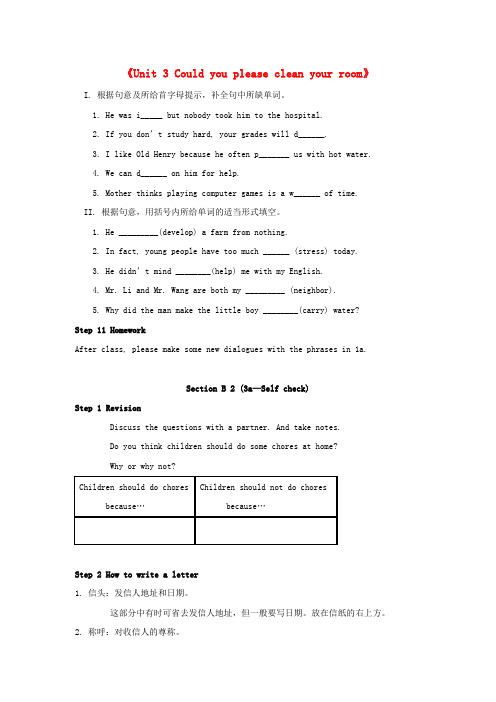
《Unit 3 Could you please clean your room》I. 根据句意及所给首字母提示,补全句中所缺单词。
1. He was i_____ but nobody took him to the hospital.2. If you don’t study hard, your grades will d______.3. I like Old Henry because he often p_______ us with hot water.4. We can d______ on him for help.5. Mother thinks playing computer games is a w______ of time.II. 根据句意,用括号内所给单词的适当形式填空。
1. He _________(develop) a farm from nothing.2. In fact, young people have too much ______ (stress) today.3. He didn’t mind ________(help) me with my English.4. Mr. Li and Mr. Wang are both my _________ (neighbor).5. Why did the man make the little boy ________(carry) water?Step 11 HomeworkAfter class, please make some new dialogues with the phrases in 1a.Section B 2 (3a—Self check)Step 1 RevisionDiscuss the questions with a partner. And take notes.Do you think children should do some chores at home?Why or why not?Step 2 How to write a letter1. 信头:发信人地址和日期。
八年级英语下册Unit3Couldyoupleasecleanyour第2课时教案
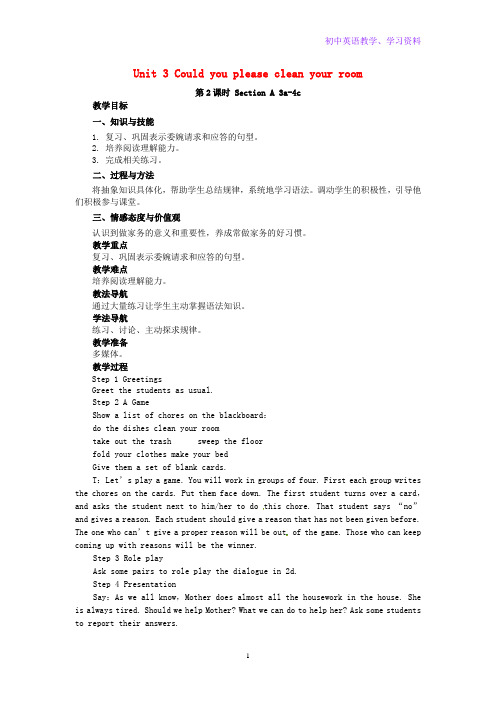
Unit 3 Could you please clean your room第2课时 Section A 3a-4c教学目标一、知识与技能1. 复习、巩固表示委婉请求和应答的句型。
2. 培养阅读理解能力。
3. 完成相关练习。
二、过程与方法将抽象知识具体化,帮助学生总结规律,系统地学习语法。
调动学生的积极性,引导他们积极参与课堂。
三、情感态度与价值观认识到做家务的意义和重要性,养成常做家务的好习惯。
教学重点复习、巩固表示委婉请求和应答的句型。
教学难点培养阅读理解能力。
教法导航通过大量练习让学生主动掌握语法知识。
学法导航练习、讨论、主动探求规律。
教学准备多媒体。
教学过程Step 1 GreetingsGreet the students as usual.Step 2 A GameShow a list of chores on the blackboard:do the dishes clean your roomtake out the trash sweep the floorfold your clothes make your bedGive them a set of blank cards.T:Let’s play a game. You will work in groups of four. First each group writes the chores on the cards. Put them face down. The first student turns over a card,and asks the student next to him/her to do this chore. That st udent says “no” and gives a reason. Each student should give a reason that has not been given before. The one who can’t give a proper reason will be out of the game. Those who can keep coming up with reasons will be the winner.Step 3 Role playAsk some pairs to role play the dialogue in 2d.Step 4 PresentationSay:As we all know,Mother does almost all the housework in the house. She is always tired. Should we help Mother? What we can do to help her? Ask some students to report their answers.Say:Now let’s read an article about Nancy and her mother. Please read quickly and answer the questions:1. Why was Nancy’s mom angry with her? 2. Did they solve the problem? How?Then ask some students to report their answers.Now let’s read the sentences in 3b,try to understand and translate them. Then read the passage again carefully and try to underline the sentences from the reading that mean the same thing. After several minutes, ask some students to repor t their answers and translate the sentences into Chinese.Step 6 Language points1. You watch TV all the time and ...all the time(在该段时间内)一直;向来,一向;时时刻刻;每时每刻e.g. I do this all the time. 我一直是这么做的。
湖南省株洲县渌口镇中学八年级英语下册《Unit 3 Could you please clean y

Unit 3 Could you please clean your room?教学目标:1语言目标:谈论做家务的词汇,及如何有礼貌的提出要求。
2 技能目标:能听懂和谈论做家务的话题;能写出重点单词和重点句型。
3 情感目标:培养学生爱劳动,分享家务的能力。
教学重点短语: do the dishes, make the bed, take out the rubbish, fold the clothes, sweep the floor, clean the living room ……句子:1. Could you please take out the rubbish?. Sure. / Sorry, I can’t. I have to finish homework first.2. Could I use your computer?Sorry. I'm going to work on it now.3. Well, could I watch TV?Yes, you can. But first you have to clean your room.教学难点:Make polite requestsAsk for permis sion课时划分:Period 1 Section A 1a – 2dPeriod 2 Section A 3a-3cPeriod 3 Section A Grammar focus-4cPeriod 4 Section B 1a-2ePeriod 5 Section B 3a-self checkSection A1 (1a – 2d)Step 1 Warming-upSing the song and dance to the musicStep 2 Presentation1. Watch the photos and talk about them “What does he do every day?’ and learnthese phrases: do chores, do the dishes, make th e bed, take out the rubbish, fold the clothes, do the laundry, clean the living room.2. Look these phrases and practice the conversation: Could you please takeout the rubbish? Sure. / Sorry, I can’t. I have to finish homework first.3. 1a Do you do these chores at home? Discuss them with your partner. Step 3 Liste ning1b Listen. Who will do these chores? Check (√) Peter’s mother or Peter. Chores Peter’s mother Peterdo the dishessweep the floortake out the rubbishmake the bedfold the clothesclean the living roomStep 4 Practice1c Make conversations about the chores in 1a.Make conversations.ExamplesA: Could you ple ase...?B: Yes, sure. /All right. /No proble m./Certainly.Sorry, I can't. I have to do...Sorry, I can't. I am doing...Step 5 Listening 2a&2bPeter asks his father if he can do four things. What does his father say? Check (√) “yes” or “no”. Listen again. Draw lines to the reasons.His father’s reasonsPeter wants to…Peter’s fathersays…go out for dinner. Yes No I have to do some work.go to the movies. Yes No You have to clean your roomstay out late. Yes No I need to eat breakfast.get a ride. Yes No You have a basketball game.Step 6 Practice2c Make conversations using the information in 2a and 2bA: Could I use your computer?B: Sorry. I’m going to work o n it now.A: Well, could I watch TV?B: Yes, you can. But first you have to clean your room?2d Role –play the conversationStep 7 Language points and summary1. help out 动词短语,表示在某人繁忙或遇到困难时“给予帮助”。
八年级英语下册Unit3《Couldyoupleasecleanyourroom》(讲)(含解析)(新版)人教新目标版
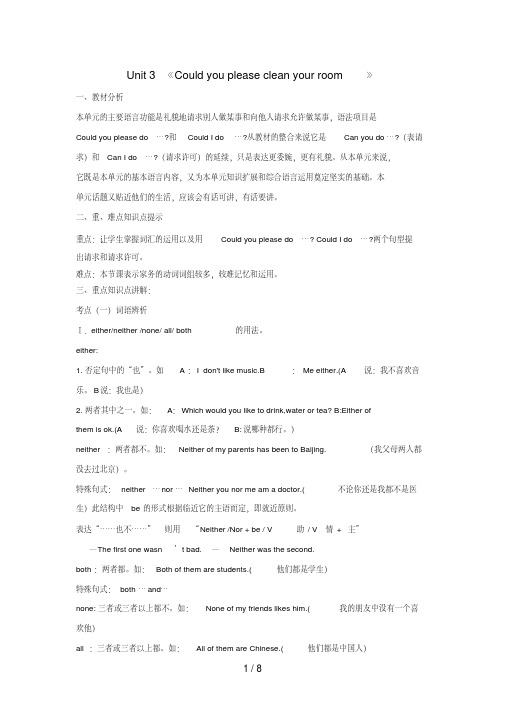
(3) be +adj. +enough to do sth be strong enough to carry the box. 【典型例题 3】 1.Jack ran ______ to catch up with other students. A. enough fast B. enough slow C. fast enough D. slow enough 【答案】 C
4/8
【解析】
试题分析:句意:杰克跑得足够快,赶上了其他同学。
enough 修饰形容词或副词时,位于
形容词或副词的后面。故排除 AB两项。 fast 快的; slow 慢的。根据 catch up with
other students. 赶上了其他同学,可知他跑得快 fast ,故选 C。
考点:考查副词的用法
2.That boy is not
to g o to school
. He is only three years old
.
A. young enough
B
. old enough
C. enough young
D
【答案】 B
. enough old
【解析】
试题分析:句意:这个小男孩年龄不够大,不能去学校。他只有三岁。 词/ 副词 +enough. 足够的 .... 。
在表示请求帮助或请求允许的疑问句中,常用
could 代替 can ,以表示礼貌,委婉或不
(同步精品课堂)八级英语下册Unit3《Couldyoupleasecleanyourroom》(讲)(含解析)(新版)人教新目标版

Unit 3《Could you please clean your room》一、教材分析本单元的主要语言功能是礼貌地请求别人做某事和向他人请求允许做某事,语法项目是Could you please do…?和Could I do …?从教材的整合来说它是Can you do…?(表请求)和Can I do …?(请求许可)的延续,只是表达更委婉,更有礼貌。
从本单元来说,它既是本单元的基本语言内容,又为本单元知识扩展和综合语言运用奠定坚实的基础。
本单元话题又贴近他们的生活,应该会有话可讲,有话要讲。
二、重、难点知识点提示重点:让学生掌握词汇的运用以及用Could you please do…? Could I do…?两个句型提出请求和请求许可。
难点:本节课表示家务的动词词组较多,较难记忆和运用。
三、重点知识点讲解:考点(一)词语辨析Ⅰ. either/neither /none/ all/ both的用法。
either:1.否定句中的“也”。
如 A:I don't like music.B: Me either.(A说:我不喜欢音乐。
B说:我也是)2.两者其中之一。
如:A:Which would you like to drink,water or tea? B:Either of them is ok.(A说:你喜欢喝水还是茶?B:说哪种都行。
)neither:两者都不。
如:Neither of my parents has been to Baijing.(我父母两人都没去过北京)。
特殊句式:neither…nor… Neither you nor me am a doctor.(不论你还是我都不是医生)此结构中be的形式根据临近它的主语而定,即就近原则。
表达“……也不……” 则用“Neither /Nor + be / V助 / V情 + 主”—The first one wasn’t bad. — Neither was the second.both:两者都。
- 1、下载文档前请自行甄别文档内容的完整性,平台不提供额外的编辑、内容补充、找答案等附加服务。
- 2、"仅部分预览"的文档,不可在线预览部分如存在完整性等问题,可反馈申请退款(可完整预览的文档不适用该条件!)。
- 3、如文档侵犯您的权益,请联系客服反馈,我们会尽快为您处理(人工客服工作时间:9:00-18:30)。
在表示请求帮助或请求允许的疑问句中,常用could代替can,以表示礼貌,委婉或不确定的语气,而can则不具备这些语气。这种情况下不能把could看作can的过去式。以上两句中用could是为了表示礼貌的请求。表示请求帮助或请求允许时,除了can, could之外,还可以用may,句子的表达方式也各有不同,可以用不同的方式来表示同一个概念。例:
Would you like + sth. / to do sth.?
May I + do sth.?
Shall we + sth.?
Would you mind + sth. /doing sth.?
What / How about + sth. /doing sth.?
肯定回答有Sure. /Of course. / Certainly. /OK. /Great. / Well. / Good idea. / I agree.等。否定回答有Sorry… / No, you can’t.等。
5. ___ Could you lend me some money?
a. Yes, here you are.
b. Hmm. How much do you need?
c. Yes, sure. No problem. I finished reading it last night.
d. Yes, but don’t come back too late.
make the bed,sweep the floor,stay out late,be angry with sb.,take sb. for a walk
clean the living room,work on,come over,do the housework,get a ride
Step2Presentation
Unit 3 Could you please clean your room Period 3 Section A
Step 1Revision
Dictation at the beginning
fold one’s clothes,do the dishes,use one’s computer,take out the rubbish
Step3 Grammar
Could you(please)+ V-原形?表示委婉地提出请求
1. Could you please clean your room?
Yes, sure. / Of course./ Certainly./All right.
2. Could you please do the dishes?
Step4 Practice
1. ___ Could Ihang out withmy friends after the movies?
出去玩
2. ___ Could you please pass me the salt?
3. ___ Could I borrow that book?
4. ___ Could you help me do the dishes?
③Do you mind if I use your car for a day?
对于句③所作回答可以说Never mind. /Not at all.表“不介意”。不能用Yes. /Sure. /Of course. /Certainly.等。无论肯定还是否定应答中,要避免使用could,要用can或may。因为应答须用确定的语气。而could在表请求的问句中是为了表示礼貌或委婉语气,用在应答中则成了不确定语气,与情理不符。所以应答中不说Yes, you could.或No, you couldn’t.而要说Yes, you can.或Sorry. /No, you can’t.
—Could I please use your computer?
—Sorry, I’m going to work on it now.
—Well, could I watch TV?
—Yes, you can.
Could I/you please …?表示一种有礼貌的请求或提议,其后连接原形动词,比Can you /I…?语气更委婉。类似句型有:
e. No, I can’t. I cut my finger and I'm trying not to get it wet.
Note:
阅读下列句子,观察问句的用法及回答。
Could I go out for dinner with my
friends?
Sure, that should be OK.
Could we get something to drink after the
movie?
No, you can’t. You have a
basketball game tomorrow.
Could you please take the dog for a walk?
OK, but I want to watch one show
first.
Could you please take out the rubbish?
Yes, sure.
①Could/Can/May I use your car for a day?
②I wonder if I could use your car for a day?
对于①、②句所作允答可以各种各样,如同意可以说Yes或Sure或Certainly,还可说Yes, (do) please.或Of course. (you may/can).或Go ahead, please.或That’s OK/all right;如果不同意,可以说I’m sorry you can’t.或I’m really sorry, but I have to use it today.要避免说No, you can’t.这样显得很不礼貌。否定回答通常用委婉语气。
